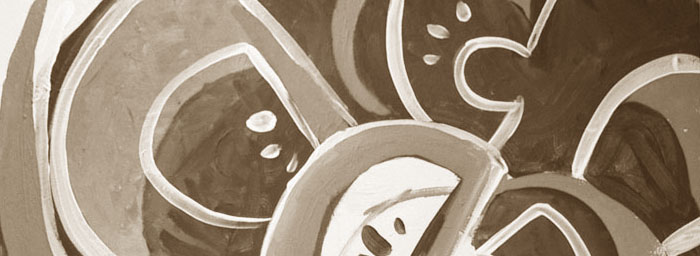Greetings Badiou!
I have recently picked up your book, Being and Event, and I am finding that you and I have been thinking about a number of things in similar ways, though you have been thinking of them in the way you have for the last 20 years or so and I have only been alive a little bit longer than that. It's funny, I keep finding out that everything I might set out to do has already been done in one way or another by somebody else. This is the only way philosophy ever proceeds I suppose, and in fact my current project is in so many ways an attempt to show in fine detail that there really isn't anything new under the sun, at least not anything new that we are inclined to care about: we've all been playing the same game of moving from the 'natural' perspective to the 'philosophical' or 'enlightened' one and it has always had roughly the same rules. They are just really difficult rules to explain to someone who has not yet mastered some of those rules themselves.
In any case I have been thoroughly enjoying your work so far, but there is one little tid-bit that I might pester you about. Much of your system seems to rely on the understanding that the null-set, the void as you call it (or as your translator has you calling it anyway, the logic is clear enough what you mean), is unique. It is the name of being, as you say, and as it can not be differentiated, there can be no difference between one void and another. On this point, sir, I must beg your pardon.
I should point out that I have not finished your work, and I have not taken the trouble to do an exhuastive search of the records, so if this question is answered in some satisfactory way in another place, I do apologize for my own blindness with regard to the vast sea of publications.
In pure set theory, as operated on by mathematicians who are blind to the ontological signifigance of their work, there is no worry about the uniqueness of the empty set. As you point out, it is the axiom of extensionality that actually proves the equality (and therefore replaceability) of any empty set with any other. This is, my friend, a far cry from uniqueness. The problem is one concerning the universe of discourse. In pure set theory, there is no universe of discourse at all. There are ony symbols and rules of symbolic manipulation. Mathematicians (in your understanding of mathematicians, which is just to say the mathematician qua mathematician, no worries about any actual human beings here...) play set theory the same way that a computer plays chess. Just bumping around in the possible manipulations of the various symbols given the rules they have for manipulating them. But when we make the meta-ontological jump, as it were, and start assigning meaning to the symbols in play, now we have a universe of discourse to take into account, and you have been none too explicit about this, which I believe may have you painted into a bit of a corner. You see, given a particular universe of discorse, some set is null with regard to it so long as no element of the universe of discourse is a member of the set. So if we are looking at the set of all vehichles manufactured in the USA and Japan, the set whose members include and are limited to you and I would be null. It would not be absolutely null, of course, but relatively null, with regards to our particular universe of discourse. Within that universe of discourse, many many sets that are not identical could only be treated as identical and as the void itself. This is all well an good, you might say, since you are dealing with the absolutely null. The truely empty set. The set which has no members. And I want to say: under what interpretation, my friend? What is or universe of discourse?
I see two possible answers. The first is that the universe of discourse just is the null set itself. This is not a bad answer: if our universe of discourse is in fact empty, then our set theoretical operations on various permutations of the empty set will be very close to the sort of operations that mathematicians perform. I believe that your answer would almost certainly be something along this line. This gives us an interpretation of the theorems of set theory as operating on that which cannot be presented. The problem is, it does not yet gurantee the uniqueness of the empty set in question. Having our universe of discourse limited absolutely to the empty set itself only locks us into the possibility that our universe of discourse is empty relatively, which would imply the possibility of an alternate interpretation, perhaps inspired by some event (I am actually hoping this is where the book goes, though I am nt sure yet. If it is, you can keep quiet and not spoil the suprise, and I shall turn out delighted if the event is in the end just exactly the finding out that what was termed the void was actually full in some way.... but I have my doubts about you) in which our empty set is only empty relative to some universe of discourse that is not exhaustive of all of being.
I suspect that it might seem that I am missing the point. Ontology presents presentation, and cannot present the unpresentable. Agreed. The unpresentable must be that which ontology operates on, to sho the presentation of the unpresentable in all its unpresentable glory. Doubly agreed. The unpresentable will forever appear within any given interpretation as identical. Thrice I nod. The void is unique. Now we part ways. The only way to gurantee the absolute uniquness of the void is to have it be null, not with regard to some limited universe of discourse, but to be null with regard to the absolute universe of discourse: the multiple of all multiples, the set of all sets. This set is forbidden in set theory, and you follow that forbiddence. I do not blame you. To allow the set of all sets, the multiple of all multiples, is to invite paradox on paradox, contradiction upon contradiction. It is pandoras box, to be sure. But either the null set is only null with regard to some limited universe of discourse and is therefore not necessarily unique, or the null set is the absolute void, in which case our universe of discorse is the set of all sets.
I propose that it must in fact be the case that set theory must operate in this second, terrifying way. Every arrangement of the symbols of set theory that is well formed has the same sort of being as any other, including sets that are 'too large' for set theory to handle, such as the set of all sets that are not members of themselves. Set theory must operate on these sets in one way or another, and the first operation it does on the troublesome ones is to kick them out of the city. To lock them away, hide them from view, and make sure they don't muck up the game we are playing. We play our game of theorem derrivation, of proofs and su-proofs, on a tiny island of logic in a vast sea of chaos, filled to the brim with sets we just cannot bear to bring ourselves to think about. Their very names strike fear in our hearts. Foridding them is akin to forbidding some possible move in a board game. Perhaps some opening always is discovered that always leads to a win, and so we forbid that particular opening in order to continue playing the game in an iteresting way. Forbidding the self contradictory sets is much like that. We could allow them, sure, but our game would be broken, we would no longer have reason to play. So instead we lock them in the mad house, mumble about their madnes here and there, and go about our lives in the walled city, perfectly content that we are protected from their ever ruining our fun. But we can only forbid them in the first place, we can only lock them up because they are there for us to see. Our universe of discourse in any symbolic system is always primarily the set of all possible strings of symbols, from which we then cut out a tiny slice called the set of all well formed formulas, which we then cut down in size, often to as close to nothing as we can get. To a few axioms perhaps. From there we take our building blocks and start to play our game, and if ever we find that we have built a mad-man, we must tinker with our tools so that such a construction is no longer possible, and we must lock him away as an example to those who might forget why our axioms are shaped the way they are.
We must never forget that we built the city we live in, and that no matter how large it grows, there will always be a wilderness outside of it, and within it, there will always be the possibility of mad men. To overcome either of these difficulties entirely, to overtake the wilderness or to lock away every last madman, would be to end the game. It is sometimes the dream of logic to make that final move, but our goal more often is simply to make sure the game stays interesting, and keeping both the threat of the wilderness and the mad alive is a part of keeping the thrill of the game alive.
I look foreward to reading the rest of your book, and perhaps someday its sequal.
Good day!
Subscribe to:
Post Comments (Atom)


No comments:
Post a Comment